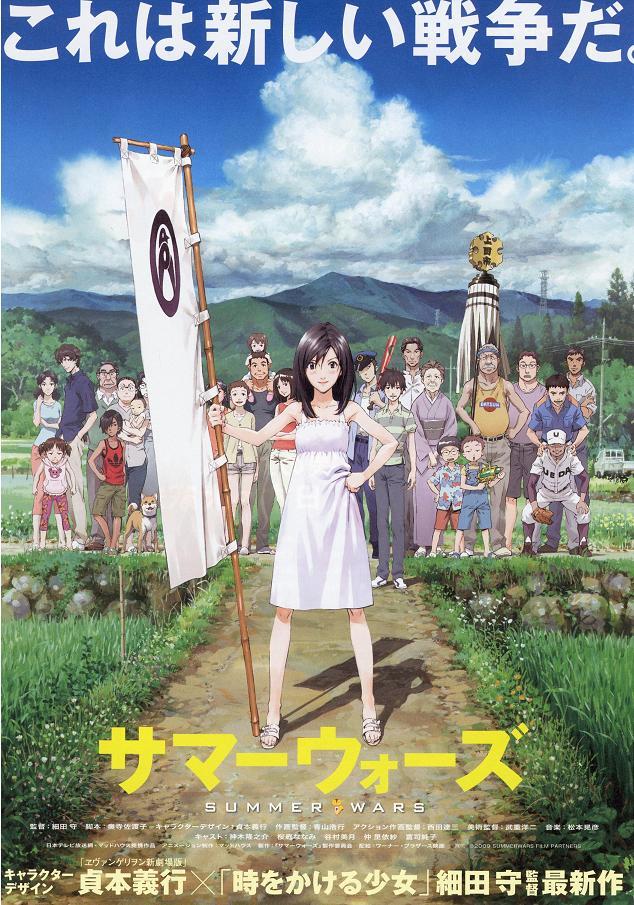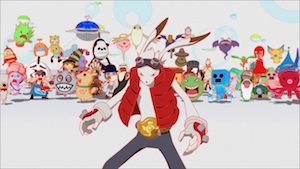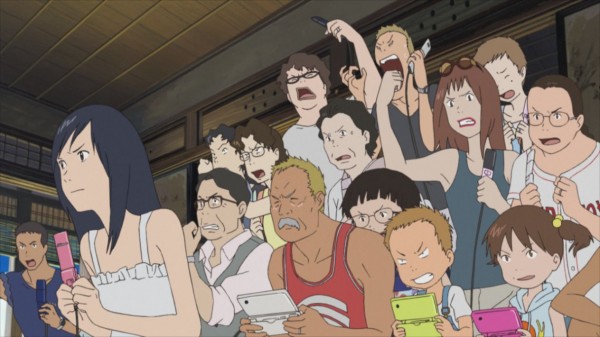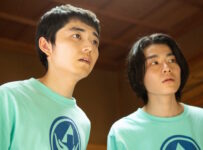 Summer Wars debuted in Australia back in June at the Sydney Film Festival, but it makes a welcome return to our shores for a limited run as part of Madman’s ReelAnime 2010 festival. Back then we said that “Summer Wars blends the digital age with traditional Japanese family values. Full of comedy, action and surprisingly rousing moments, Summer Wars was a perfect way to end my festival program”. Very little has changed that initial review on the film, in which we rated it one of our Top 5 Films of SFF 2010. From Mamoru Hosoda, the director of The Girl Who Leapt Through Time, the former Digimon helmer delivers something that is close to anime perfection.
Summer Wars debuted in Australia back in June at the Sydney Film Festival, but it makes a welcome return to our shores for a limited run as part of Madman’s ReelAnime 2010 festival. Back then we said that “Summer Wars blends the digital age with traditional Japanese family values. Full of comedy, action and surprisingly rousing moments, Summer Wars was a perfect way to end my festival program”. Very little has changed that initial review on the film, in which we rated it one of our Top 5 Films of SFF 2010. From Mamoru Hosoda, the director of The Girl Who Leapt Through Time, the former Digimon helmer delivers something that is close to anime perfection.
High school maths wiz Kenji Koiso spends most of his time in OZ, a computer network that is something of a cross between a mass-multiplayer game and a social network that connects all social and business functions in society. He is asked by Natsuki, the most popular girl in school, to accompany her to her family home for a ‘job’ during her grandmother’s ninetieth birthday. However, when they arrive Natsuki informs her family that Kenji is her boyfriend, and completely falsifies his background. Reluctantly going along with the plan, their collective worlds are soon turned upside-down when a long-lost relative returns and a mysterious artificial intelligence begins corrupting the virtual OZ with very dangerous real world consequences.
When reviewing The Girl Who Leapt Through Time, we noted that we were looking forward to seeing whatever Hosada had in store for us next. Little did I suspect that it would be one of the best films of the year, and possibly one of the best anime features to come out of Japan in the last ten years. Despite having a high-tech edge to it, with a battle raging inside a virtual world that threatens to spill over into reality, at its core it is a film about family. Indeed, viewers are unlikely to spend their time waiting for the next OZ battle as the scenes with the clan are just as compelling (if not more so) than the computer generated battles in the virtual world. Like Spirited Away, this very Japanese of tales crosses cultural boundaries and will appeal to a broad range of audiences. Although many of the cultural aspects, including the traditional game Koi-Koi that is used as a motif throughout the film, will have more of an impact with Japanese audiences, the broader themes of finding connections and ‘home is where the heart is’ will ring true for all viewers. If there are elements that seems familiar in this tale, and certainly the awkward character of Kenji could have stepped out of just about any anime tale you’ve seen, this only adds to the feeling of being wrapped inside a warm blanket before being taken on wild ride.
 The animation is magnificent as well, with art direction by Studio Ghibli veteran Youji Takeshige (Spirited Away, Ponyo). There has been a tension within Japanese animation between traditional 2D animation and the apparently cheaper computer generated kind, and Summer Wars manages to encompass both worlds beautifully. A startling amount of detail is on-screen during the scenes set in OZ, with a blink and you’ll miss it attitude that will demand repeat viewings. Likewise, the traditional animation is soaked in small touches that bring a warmth and reality to this tale of a small-town set in Nagano. This is a science-fiction tale that looks like it is set in Japan, from the hanafuda cards to the traditional houses of the city of Ueda. Likewise, anyone who has every spent a Christmas or special occasion with their partner’s extended family will know exactly how Kenji feels throughout this accurate depiction of family life.
The animation is magnificent as well, with art direction by Studio Ghibli veteran Youji Takeshige (Spirited Away, Ponyo). There has been a tension within Japanese animation between traditional 2D animation and the apparently cheaper computer generated kind, and Summer Wars manages to encompass both worlds beautifully. A startling amount of detail is on-screen during the scenes set in OZ, with a blink and you’ll miss it attitude that will demand repeat viewings. Likewise, the traditional animation is soaked in small touches that bring a warmth and reality to this tale of a small-town set in Nagano. This is a science-fiction tale that looks like it is set in Japan, from the hanafuda cards to the traditional houses of the city of Ueda. Likewise, anyone who has every spent a Christmas or special occasion with their partner’s extended family will know exactly how Kenji feels throughout this accurate depiction of family life.
Summer Wars represents the awakening of a magnificent talent, and deserves to be spoken of in the same terms as the wonderful Studio Ghibli/Hayao Miyazaki films and may just be an instant classic. Combining all the elements of the digital age with the wonderful traditions of Japan, Summer Wars is a unique film on the global anime front in that it manages to combine absolutely dazzling visuals with commentary on the generation gap in Japan while simultaneously making it accessible to audiences worldwide. Anybody not moved to a standing ovation, or at least a mental one, by the end of this film simply doesn’t have a pulse.
Overall rating: Certified Bitstastic
Reel Anime runs from 2 to 15 September 2010. Other films playing at the Reel Anime Festival include Evangelion 1.0: You Are (Not) Alone, Evangelion 2.0: You Can (Not) Advance, King of Thorn and Redline.





No Responses